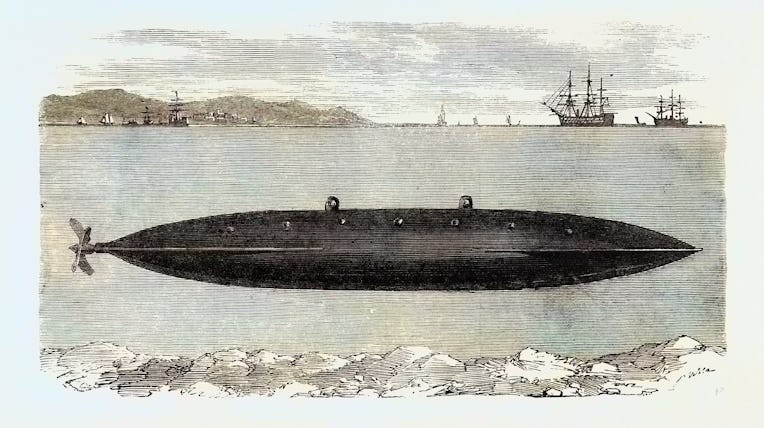FBI: A Navy Engineer Used a Sandwich to Commit Treason
Sorry Jared, there's a new alleged sandwich criminal in town

If you are an employee of the United States Navy in possession of restricted information about nuclear powered submarines, and set off to sell that information to a foreign government — an offense punishable by a maximum sentence of “life imprisonment or death” — it is generally good practice to avoid chatting up an undercover FBI agent.
Unfortunately for Jonathan Toebbe, a nuclear engineer for the United States Navy who allegedly tried to do just that, he may have overlooked this critical step — which is how he got caught apparently trying to hide confidential hard drives inside a peanut butter sandwich, a bandaid, and a pack of chewing gum.
According to a lengthy complaint unsealed Friday, the story begins with an email exchange last year, in which Toebbe allegedly tried to sell secret submarine info to someone he believed to be a friend, but turned out to be a callous, two-faced liar, merely exploiting his neediness for professional gain. In a sign of Toebbe’s empathic orientation — and as a security measure to show that he was not being impersonated — he signed all of his emails with the same signature: “Yours truly.” Sadly, the recipient of his kind messages turned out to not be a friend at all, but an FBI agent.
It is never ideal for your private messages to wind up in a lawsuit, and this particular series of exchanges was pretty damning, in that it seemed to prove Toebbe had committed two federal offenses: conspiracy to communicate restricted data and communication of restricted data. According to an affidavit from FBI Special Agent Justin Von Tromp, here is what happened:
In April 2020, Toebbe allegedly sent a package to a foreign country, identified only as “COUNTRY1,” attempting “to establish a covert relationship.” The package included some U.S. Navy documents, an SD card with instructions on how to respond, and a letter which read:
I apologize for this poor translation into your language. Please forward this letter to your military agency. I believe this information will be of great value to your nation. This is not a hoax.
The SD card included encrypted keys to send messages on ProtonMail, a secure email service run out of Geneva. The keys included the names of two aliases: “Alice Hill” and “Bob Burns.” (In security circles, “Alice” and “Bob” are recurring nicknames for fictional characters used to explain various cryptography protocols; this dates back to a 1978 paper, which possibly cribbed the names from the 1960s movie “Bob & Carol & Ted & Alice.”)
By December of 2020, this package had wound up in the hands of an “FBI attaché” in that country, who sent “Alice” an email, using the pseudonym “Bob.” Here’s what they wrote:
We received your letter. We want to work with you. It has been many months, so we need to know if you are still out there. Please respond to this message, then we will provide instruction on how to proceed.
Fake Alice, whom the FBI claims was Toebbe, got back to them three months later, on Feb. 10, 2021:
Thank you for contacting me. I am still here. The covid disease has made it more difficult to find chances to check this email. Let us discuss how to proceed.
From there, Fake Alice (Toebbe, allegedly) and Fake Bob (the FBI) set out to arrange a drop-off for the secret submarine information. The FBI wanted a face-to-face meeting. Toebbe did not, for obvious reasons. Instead, the complaint claims he asked for $100,000 in Monero — a private cryptocurrency that boasts being less traceable than Bitcoin — in exchange for a download link with the files.
But they compromised on a neutral drop location, where the FBI would leave some money and Alice would drop a memory card with the files. The FBI sent $10,000 in advance as a sign of “good faith and trust,” then agreed on a drop-spot in Jefferson Country, West Virginia — which is where Jonathan Toebbe and his wife, a humanities teacher named Diana Toebbe, showed up on June, 26, 2021 and allegedly left behind a plastic bag with a 16GB SD card.
Per the complaint, the SD card was “wrapped in plastic and placed between two slices of bread on a half of a peanut butter sandwich.” Mmm. Over the next few weeks, Toebbe and the FBI would arrange two more drops. The second involved a card hidden “in a sealed Band-Aid wrapper with a Band-Aid inside a clear Zip Lock bag.” The third hid a card “in a chewing gum package.”
Perhaps Toebbe thought he was merely furnishing his friend with some snacks and first aid. After all, over their months-long correspondence, he had recommended several friendly meet-ups, including:
- “Hiking and visiting historical sites.”
- “A beautiful hike close to home.”
- “A chance to stumble into each other at a cafe, share a bottle of wine and laugh over stories of their shared exploits.”
Unfortunately, the FBI agent ignored Toebbe’s attempts at a deeper friendship and only cared about the fact that the SD cards contained restricted information about “nuclear-powered cruise missile fast attack submarines, which incorporate the latest in stealth, intelligence gathering, and weapons systems technology,” that cost roughly $3 billion per unit.
On Monday, federal prosecutors filed a motion in West Virginia District Court to hold Toebbe in pretrial detention, claiming the engineer was a flight risk. They seem to have pretty good grounds for this, as Toebbe had once told his friend:
I have considered the possible need to leave on short notice...I surmise the first step would be unannounced travel to a safe third country with plans to meet your colleagues. We have passports and cash set aside for this purpose.
Can’t trust anyone these days.